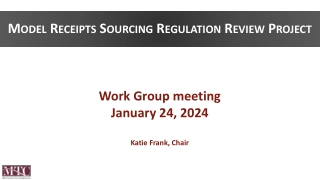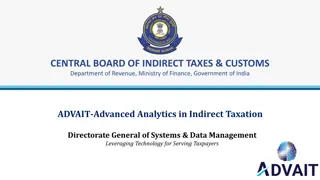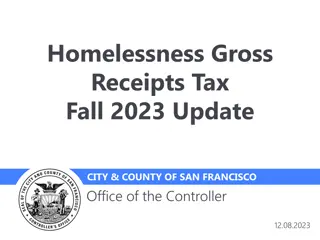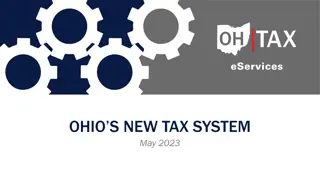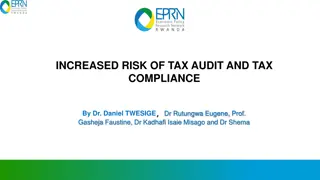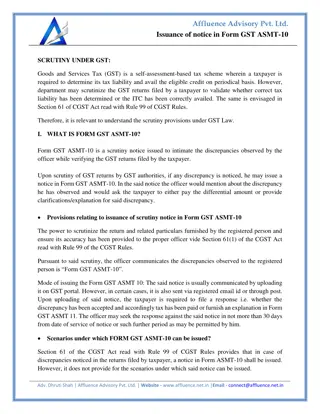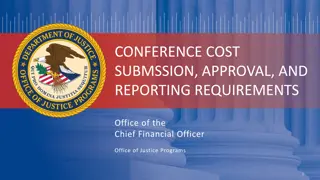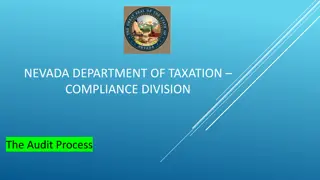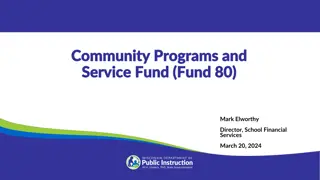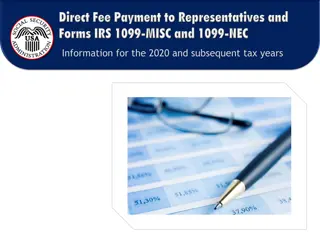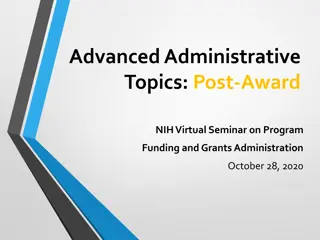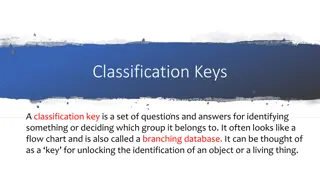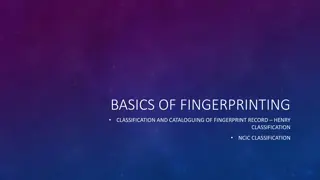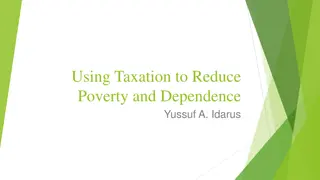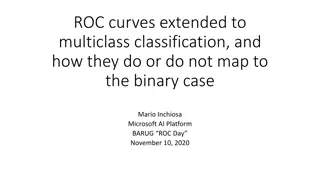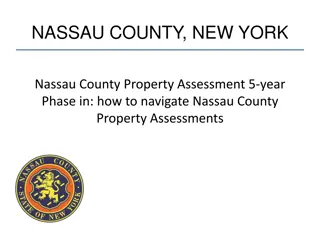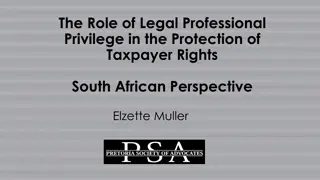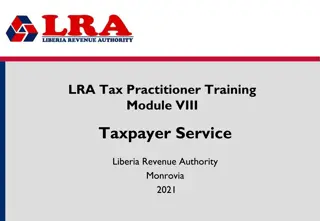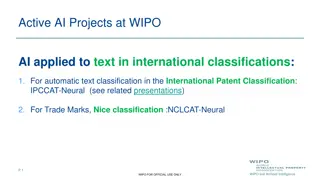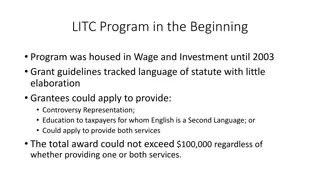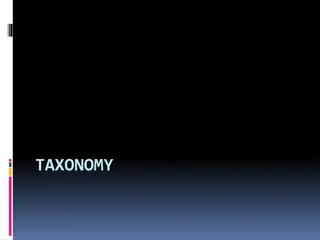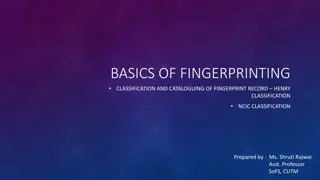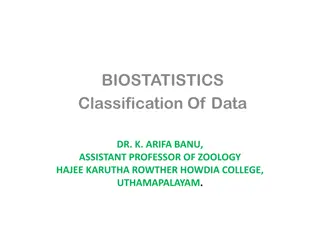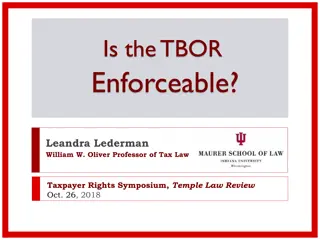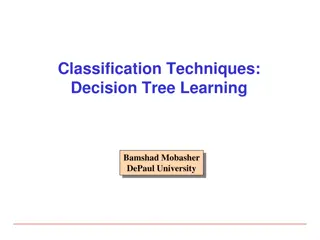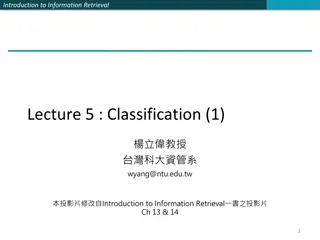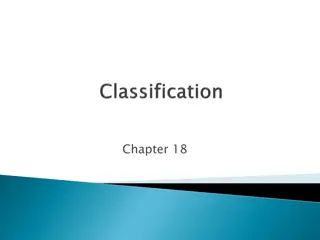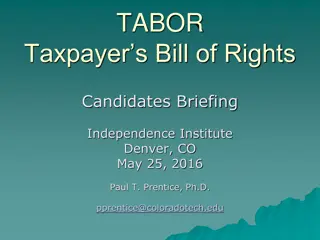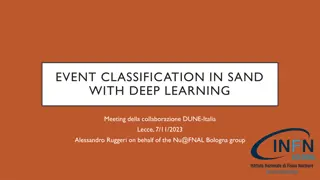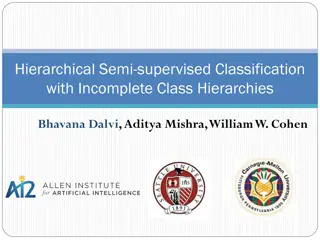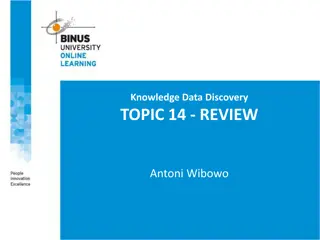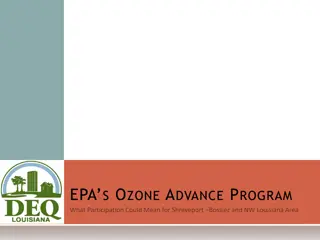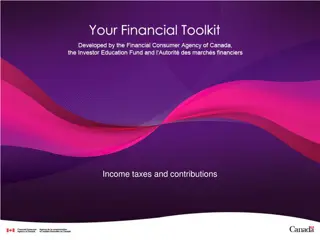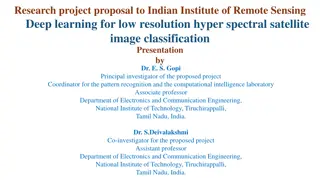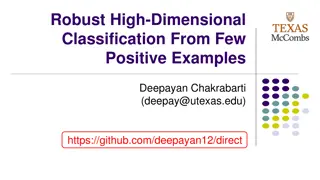Renewing Richmond's Conservation Reserve Fund
Richmond's Conservation Reserve Fund has a successful 18-year track record in protecting water and air quality, biodiversity, working farms and forests, outdoor recreation, historic resources, and education. Established in 2005 and last renewed by voters in 2023, the fund has brought in over $2.0 mi
0 views • 9 slides
Work Group meeting
This review project aims to assess the need for a special industry rule for trucking companies given the shift to market-based sourcing by the MTC. Factors prompting the review include distortion in applying the mileage approach, differences in revenue per mile among states, and the nature of taxpay
0 views • 21 slides
Advanced Analytics in Indirect Taxation by Central Board of Indirect Taxes & Customs
The Central Board of Indirect Taxes & Customs in India leverages technology through ADVAIT to provide near real-time data capture, predictive analytics, and fraud detection in the realm of indirect taxation. This initiative enhances taxpayer service with cutting-edge data visualization, mobile acces
2 views • 28 slides
San Francisco Business Tax Revenue Forecast Update Fall 2023
San Francisco is facing a significant loss in business tax revenue compared to budget projections, with estimates ranging from $40M to $55M in annual losses for current and future fiscal years. The Homelessness Gross Receipts Tax (HGR) is a key source of revenue, but its revenue has been volatile an
0 views • 7 slides
Ohio's New Tax System Overview May 2023
Ohio is launching a new tax system in May 2023 aiming to improve taxpayer service, modernize technical systems, enhance user experience, and ensure secure taxpayer information. The project scope includes Individual Income Tax and School District Tax, with key dates set for testing in August 2023 and
5 views • 11 slides
Enhancing Tax Compliance: Factors, Audit, and Investigation" (56 characters)
Exploring factors influencing taxpayer behavior towards tax compliance, this study delves into the impact of tax audit and investigation procedures on adherence to tax laws at both corporate and individual levels. Previous research gaps are identified and addressed to provide a comprehensive underst
1 views • 20 slides
Issuance of notice in Form GST ASMT-10
Form GST ASMT-10 is a scrutiny notice issued to intimate the discrepancies observed by the officer while verifying the GST returns filed by the taxpayer.\n\nUpon scrutiny of GST returns by GST authorities, if any discrepancy is noticed, he may issue a notice in Form GST ASMT-10. In the said notice t
1 views • 6 slides
For Tax Filing - Analyze the Tax Regime
As the financial year closes, taxpayers would need to ensure that their books of accounts, pay slips, bank statements and other important documents are in place such that the details are available at the time of audit and filing the return of income. While filing the return of income, a taxpayer mu
0 views • 3 slides
Conference Cost Submission, Approval, and Reporting Guidelines for DOJ Programs
This policy outlines the requirements and procedures for managing conference costs within the Department of Justice (DOJ). It covers planning, approval, attendance, and reporting of conferences while ensuring efficient and responsible use of federal funds. The guidelines aim to promote cost-effectiv
3 views • 48 slides
Nevada Department of Taxation Compliance Division Audit Process Overview
Responsible for ensuring taxpayer compliance with various taxes, the Nevada Department of Taxation Compliance Division conducts audits locally and nationwide. From refund verification to audit selection criteria, learn about the audit process, taxes audited, time periods, initial contact procedures,
5 views • 18 slides
Community Programs and Service Fund (Fund 80) Overview
The Community Programs and Service Fund (Fund 80) is a local taxpayer-funded initiative that allows school boards to provide community education, training, recreational, cultural, and athletic programs and services. This fund is separate from the regular school curriculum and operates under specific
0 views • 20 slides
Taxpayer Information for Direct Fee Payments - Guidelines and Forms
Guidelines and procedures for providing taxpayer information to the IRS for direct fee payments made to representatives of claimants for Social Security and Supplemental Security Income benefits. Learn how to register, complete required forms, and request direct payment online. Find information on e
0 views • 30 slides
Insights into Post-Award Challenges in NIH Grants Administration
Explore the complexities and issues in post-award management of NIH grants through case studies and real-life examples. Key aspects discussed include changes in recipient organizations, research team delays, large balances, and unexpected changes post-award. Gain perspectives on federal policies, ta
0 views • 41 slides
Understanding Classification Keys for Identifying and Sorting Things
A classification key is a tool with questions and answers, resembling a flow chart, to identify or categorize things. It helps in unlocking the identification of objects or living things. Explore examples like the Liquorice Allsorts Challenge and Minibeast Classification Key. Also, learn how to crea
1 views • 6 slides
Basics of Fingerprinting Classification and Cataloguing
Fingerprint classification is crucial in establishing a protocol for search, filing, and comparison purposes. It provides an orderly method to transition from general to specific details. Explore the Henry Classification system and the NCIC Classification, and understand why classification is pivota
5 views • 18 slides
Challenges of Kenyan Taxation System and Solutions
The Kenyan taxation system faces complexities in terms of the ITax system, low taxpayer acceptance, capacity issues at the Kenya Revenue Authority (KRA), and lack of political will. Simplifying the filing process, increasing taxpayer education on the importance of taxes, enhancing KRA capacity, and
1 views • 13 slides
Understanding ROC Curves in Multiclass Classification
ROC curves are extended to multiclass classification to evaluate the performance of models in scenarios such as binary, multiclass, and multilabel classifications. Different metrics such as True Positive Rate (TPR), False Positive Rate (FPR), macro, weighted, and micro averages are used to analyze t
3 views • 8 slides
Nassau County Property Assessments Overview
The Nassau County Department of Assessment oversees valuing a large number of residential and commercial parcels, implementing a reassessment in 2018 to address inaccuracies and disparities in property values. The Taxpayer Protection Plan (TPP) was introduced to phase in assessment increases over fi
0 views • 9 slides
Legal Professional Privilege in the Protection of Taxpayer Rights: South African Perspective
Legal professional privilege plays a crucial role in safeguarding taxpayer rights in South Africa. This privilege ensures that communications between a legal advisor and client remain confidential, promoting fairness in litigation and enabling a proper functioning adversarial system of justice. The
0 views • 16 slides
Enhancing Taxpayer Education for Voluntary Compliance
Liberian taxes operate on a self-assessment system, where taxpayers must assess, submit returns, and pay taxes. Taxpayer education is crucial in promoting voluntary compliance. The Liberia Revenue Authority's Taxpayer Service Division conducts extensive educational programs covering tax types, respo
0 views • 21 slides
Understanding Classification in Data Analysis
Classification is a key form of data analysis that involves building models to categorize data into specific classes. This process, which includes learning and prediction steps, is crucial for tasks like fraud detection, marketing, and medical diagnosis. Classification helps in making informed decis
2 views • 72 slides
AI Projects at WIPO: Text Classification Innovations
WIPO is applying artificial intelligence to enhance text classification in international patent and trademark systems. The projects involve automatic text categorization in the International Patent Classification and Nice classification for trademarks using neural networks. Challenges such as the av
2 views • 10 slides
Evolution of Low Income Taxpayer Clinics (LITC) Program
The Low Income Taxpayer Clinics (LITC) Program has evolved over the years to ensure fairness and integrity in the tax system for low-income taxpayers and those who speak English as a second language. Initially housed in Wage and Investment, the program now reports to the National Taxpayer Advocate.
0 views • 10 slides
Understanding Taxonomy and Scientific Classification
Explore the world of taxonomy and scientific classification, from the discipline of classifying organisms to assigning scientific names using binomial nomenclature. Learn the importance of italicizing scientific names, distinguish between species, and understand Linnaeus's system of classification.
0 views • 19 slides
Overview of Fingerprint Classification and Cataloguing Methods
Explore the basics of fingerprint classification, including Henry Classification and NCIC Classification systems. Learn about the importance of classification in establishing protocols for searching and comparison. Discover the components of Henry Classification, such as primary, secondary, sub-seco
1 views • 21 slides
Understanding BioStatistics: Classification of Data and Tabulation
BioStatistics involves the classification of data into groups based on common characteristics, allowing for analysis and inference. Classification organizes data into sequences, while tabulation systematically arranges data for easy comparison and analysis. This process helps simplify complex data,
0 views • 12 slides
Understanding the Enforceability of Taxpayer Bill of Rights (TBOR)
Explore the enforceability of the Taxpayer Bill of Rights (TBOR) as outlined in IRC 7803(a)(3), delving into its history, statutory interpretation, the question of remedy, and enforcement issues. Discover the evolution of TBOR, statutory text, and challenges surrounding its enforcement.
0 views • 21 slides
Introduction to Decision Tree Classification Techniques
Decision tree learning is a fundamental classification method involving a 3-step process: model construction, evaluation, and use. This method uses a flow-chart-like tree structure to classify instances based on attribute tests and outcomes to determine class labels. Various classification methods,
5 views • 20 slides
Understanding Text Classification in Information Retrieval
This content delves into the concept of text classification in information retrieval, focusing on training classifiers to categorize documents into predefined classes. It discusses the formal definitions, training processes, application testing, topic classification, and provides examples of text cl
0 views • 57 slides
Understanding Taxonomy and Classification in Biology
Scientists use classification to group organisms logically, making it easier to study life's diversity. Taxonomy assigns universally accepted names to organisms using binomial nomenclature. Carolus Linnaeus developed this system, organizing organisms into species, genus, family, order, class, phylum
0 views • 11 slides
Mineral and Energy Resources Classification and Valuation in National Accounts Balance Sheets
The presentation discusses the classification and valuation of mineral and energy resources in national accounts balance sheets, focusing on the alignment between the System of Environmental-Economic Accounting (SEEA) and the System of National Accounts (SNA) frameworks. It highlights the need for a
0 views • 17 slides
Understanding TABOR: Taxpayer's Bill of Rights Overview
The Taxpayer's Bill of Rights (TABOR) is a crucial constitutional amendment in Colorado that limits government spending and empowers citizens to vote on expenditure increases. TABOR aims to secure individual freedoms and prevent excessive government control through financial accountability. This bri
0 views • 10 slides
Event Classification in Sand with Deep Learning: DUNE-Italia Collaboration
Alessandro Ruggeri presents the collaboration between DUNE-Italia and Nu@FNAL Bologna group on event classification in sand using deep learning. The project involves applying machine learning to digitized STT data for event classification, with a focus on CNNs and processing workflows to extract pri
0 views • 11 slides
Hierarchical Semi-Supervised Classification with Incomplete Class Hierarchies
This research explores the challenges and solutions in semi-supervised entity classification within incomplete class hierarchies. It addresses issues related to food, animals, vegetables, mammals, reptiles, and fruits, presenting an optimized divide-and-conquer strategy. The goal is to achieve semi-
0 views • 18 slides
Understanding Classification in Data Mining
Classification in data mining involves assigning objects to predefined classes based on a training dataset with known class memberships. It is a supervised learning task where a model is learned to map attribute sets to class labels for accurate classification of unseen data. The process involves tr
0 views • 26 slides
Overview of Hutchinson and Takhtajan's Plant Classification System
Hutchinson and Takhtajan, as presented by Dr. R. P. Patil, Professor & Head of the Department of Botany at Deogiri College, Aurangabad, have contributed significantly to the field of plant classification. John Hutchinson, a renowned British botanist, introduced a classification system based on princ
0 views • 20 slides
Understanding the EPA's Ozone Advance Program and Clean Air Act
The content covers key information about the EPA's Ozone Advance Program, including the basics of ozone, the Clean Air Act requirements, designation vs. classification, classification deadlines, and marginal classification requirements. It explains the formation of ozone, the importance of reducing
0 views • 40 slides
Understanding Income Taxes and Contributions in Canada
This content provides an overview of income taxes and contributions in Canada, covering topics such as tax facts, tax basics, taxpayer rights and responsibilities, types of taxes, government revenues, and key messages for Canadian taxpayers. It emphasizes the importance of filing tax returns accurat
0 views • 43 slides
Deep Learning for Low-Resolution Hyperspectral Satellite Image Classification
Dr. E. S. Gopi and Dr. S. Deivalakshmi propose a project at the Indian Institute of Remote Sensing to use Generative Adversarial Networks (GAN) for converting low-resolution hyperspectral images into high-resolution ones and developing a classifier for pixel-wise classification. The aim is to achiev
0 views • 25 slides
Robust High-Dimensional Classification Approaches for Limited Data Challenges
In the realm of high-dimensional classification with scarce positive examples, challenges like imbalanced data distribution and limited data availability can hinder traditional classification methods. This study explores innovative strategies such as robust covariances and smoothed kernel distributi
0 views • 10 slides

